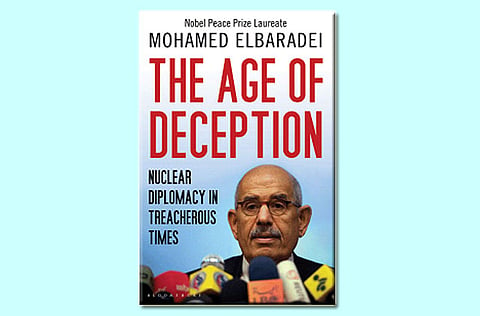Hypocricies exposed
How the lack of equity in matters of nuclear power has led to a world divided

A lack of fairness and equity in how the world manages its nuclear affairs has sabotaged even the most common-sensical and just resolutions. These words come from Mohamed ElBaradei, the former head of the United Nations International Atomic Energy Agency (IAEA) whose underlying belief that the UN must manage the world's nuclear affairs was challenged by the hypocrisy of some of the world's leading nuclear powers.
ElBaradei has written a very readable book that takes the reader through what really happened when the Bush administration decided to go to war with Iraq, regardless of any findings from the investigating agencies and how this has affected the way the United States, and the international community, is handling the nuclear stand-offs with Iran and North Korea. ElBaradei also finds time to guide the reader through the complicated details of the Non-Proliferation Treaty (NPT) and its all-too-often ignored core assumption: that all member states should work towards nuclear disarmament.
Looking to the future, ElBaradei makes a strong case for two particular initiatives to strengthen the multinational systems which back the nuclear watchdog. The first seems obvious: The highest level of security must be provided for nuclear and radioactive material to keep it out of the hands of extremists. The second is to move the control of the nuclear fuel cycle from national to multinational — in December 2010 the IAEA gave this idea an important start by adopting a resolution to authorise a fuel bank of low-enriched uranium under Agency control to provide an assured supply to genuine users.
The UAE has already adopted this approach for its future nuclear power station in Al Baraka in Abu Dhabi. It has foregone its right to enrich uranium and has done so to lead the way in developing this new multinational route to manage nuclear fuel. The problem is that the same process of enrichment that provides the fuel for peaceful nuclear power plants can also be used to make the material for a nuclear bomb. The purpose of the UAE's decision and the IAEA's new initiative is to distance the urgent need for nuclear power in many countries around the world from any suspicion that their enrichment might be misused to make nuclear weapons. By separating the process of running power plants from enrichment, there will no longer be a direct link between the peaceful and warlike nuclear activities.
During the 1990s and early 2000s, ElBaradei attracted strong criticism when he had argued that the five states with declared nuclear weapons (United States, Russia, China, the United Kingdom and France) should adopt a new approach with the three states — Israel, Pakistan and India — that have weapons but had never joined the NPT. He argued then, and still does, that the three should be treated as nuclear partners, rather than pariahs, since they have broken no treaties or agreements by going nuclear. His reasoning is that no headway can be made towards the reduction of nuclear weapons, never mind complete disarmament, without their consent.
This was why in 2006 ElBaradei supported the controversial decision by the Bush administration to strike a deal with India on civil nuclear cooperation, despite India having tested nuclear weapons in 1998 while being outside the NPT. But ElBaradei made no progress when he argued that the Americans should offer the same approach to Pakistan, with secretary of state Condoleezza Rice refusing to even go so far as to agree that such an approach might be possible if the conditions were right.
ElBaradei's point is that the IAEA's duty goes beyond the national politicians it has to deal with.
A recurring theme throughout the book is that the world committed itself to complete nuclear disarmament when the vast majority of its member states signed up to the NPT, despite this promise being dumped in the day-to-day cut and thrust of international affairs. NPT's fundamental premise is that non-proliferation will work if the states with nuclear weapons agree to disarm, and if those without weapons agree that they do not need them.
The failure of this basic bargain is where ElBaradei is at his most compelling. He describes how hypocrisy from the five states with weapons has built the rest of the world's mistrust about their motives behind nuclear weapons.
ElBaradei offers many examples of this, such as when he criticised Tony Blair's administration in Britain for going ahead with an upgrade of its Trident ballistic missiles, arguing that it is hard for the IAEA to tell other nations they should not have nuclear weapons, when the UK and other nations continue to modernise their own.
The attitude was summed up by Blair's foreign secretary David Milliband, who had been struggling with the situation in Iran, and burst out with a question: "Why do you think Iran wants to have nuclear weapons?". ElBaradei wanted to reply, "Why does the UK have nukes?", but remained tactfully silent, although the astounding double standards implied in Milliband's outburst shows clearly how the five nuclear powers still think of themselves as the sole possessors of the right to nuclear weapons.
Despite the deep fears of proliferation, ElBaradei remains optimistic that peaceful nuclear technology will spread around the world, with all its vital benefits of masses of new power being created with no carbon impact, while at the same time keeping afloat the possibility of nuclear disarmament.
It may be that ElBaradei is being over-optimistic with some of his hopes, but it is essential that this optimism is argued well and is shared as widely as possible. The world needs this vision.
The Age of Deception: Nuclear Diplomacy in Treacherous TimesBy Mohamed ElBaradei, Bloomsbury, 352 pages, £20
Sign up for the Daily Briefing
Get the latest news and updates straight to your inbox

